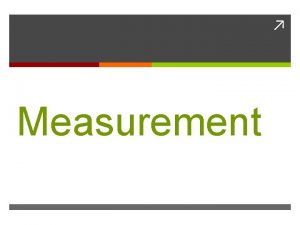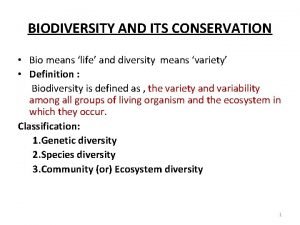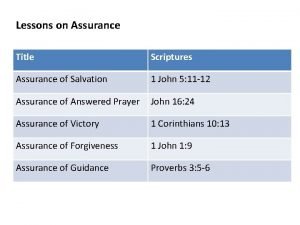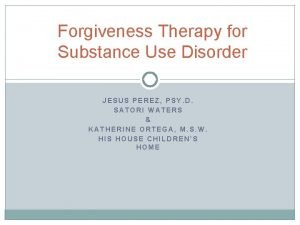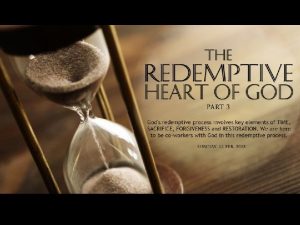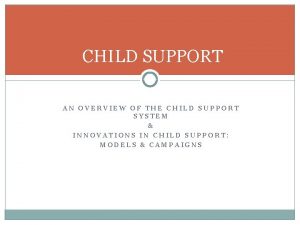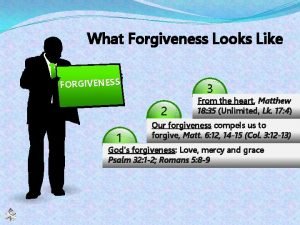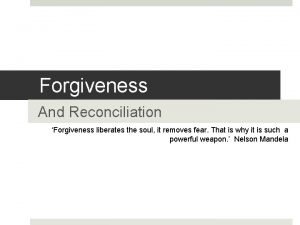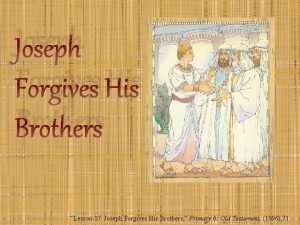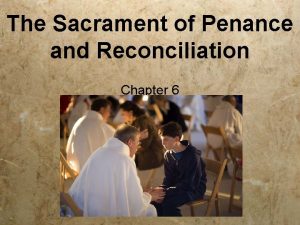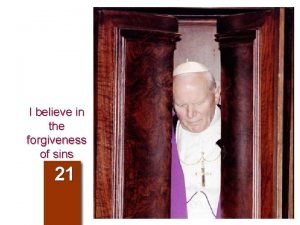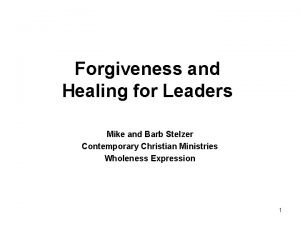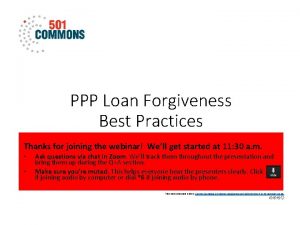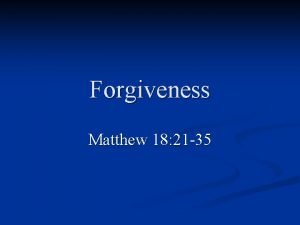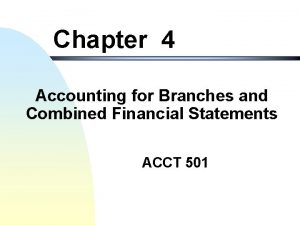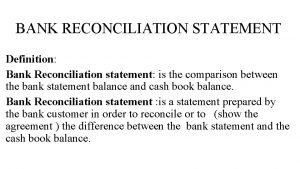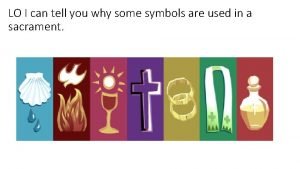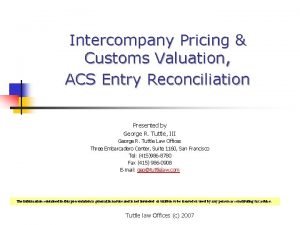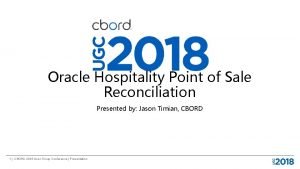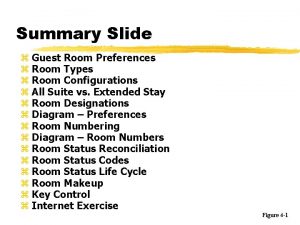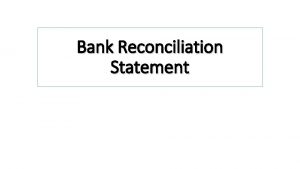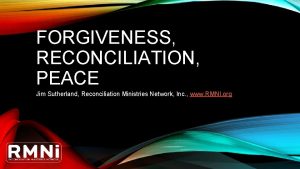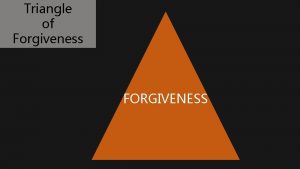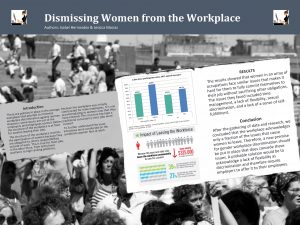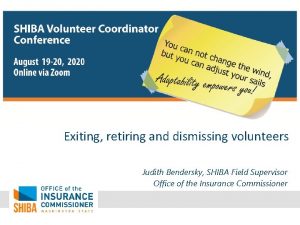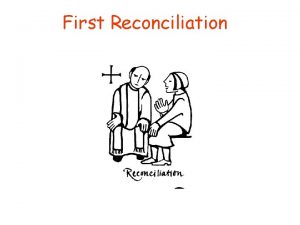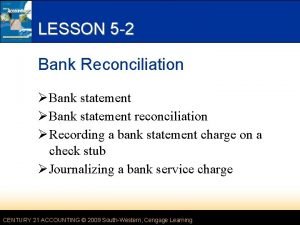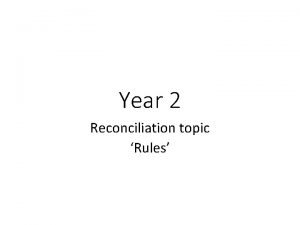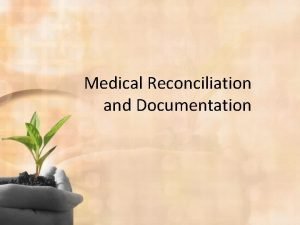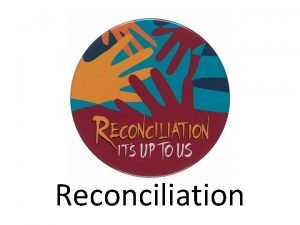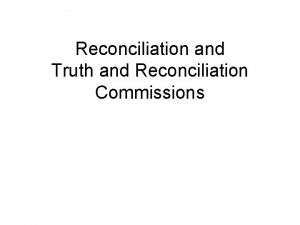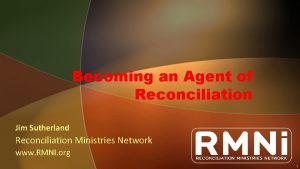FORGIVENESS RECONCILIATION WHAT IS FORGIVENESS Forgiveness means dismissing













































- Slides: 45

FORGIVENESS & RECONCILIATION

WHAT IS FORGIVENESS? • Forgiveness means dismissing a debt. In the New Testament, the Greek noun aphesis denotes a "dismissal" or "release. " —When you grant forgiveness, you dismiss the debt owed to you. —When you receive forgiveness, your debt is dismissed. (You are released from any requirement for repayment. )

WHAT IS FORGIVENESS? • Forgiveness is dismissing your demand that others owe you something, something especially when they fail to meet your expectations. . . fail to keep a promise. . . fail to treat you justly. • Forgiveness is dismissing, canceling, or setting someone free from the consequence of falling short of God's standard.

WHAT IS RECONCILIATION? • Reconciliation is the act of settling or restoring differences Most often, reconciliation means the restoring of a relationship. It is a settling or resolving of differences between friends. — The Greek word katallasso, translated "reconciled" reconciled in the New Testament, means "to change mutually" mutually or, figuratively, "to settle a debt amicably. ” amicably

WHAT IS RECONCILIATION? TYPES OF RECONCILIATION —financial. . to bring accounting records into agreement —relational. . to bring a broken relationship into harmony —personal. . to be at peace with our circumstances or with ourselves —spiritual. . to be at harmony with God

IS FORGIVENESS THE SAME AS RECONCILIATION? FORGIVENESS is NOT the same as RECONCILIATION. Forgiveness focuses on the offense, whereas reconciliation focuses on the relationship. Forgiveness requires no relationship. However, reconciliation requires a relationship in which two people, in agreement, are walking together toward the same goal.

IS FORGIVENESS THE SAME AS RECONCILIATION? Forgiveness can take place with only one person. —Reconciliation requires at least two persons. Forgiveness is directed one-way. —Reconciliation is reciprocal. . . occurring two-ways. Forgiveness is a decision to release the offender. —Reconciliation is the effort to rejoin the offender.

IS FORGIVENESS THE SAME AS RECONCILIATION? Forgiveness involves a change in thinking about the offender. —Reconciliation involves a change in behavior by the offender. Forgiveness is a free gift to the one who has broken trust. —Reconciliation is a restored relationship based on restored trust.

IS FORGIVENESS THE SAME AS RECONCILIATION? Forgiveness is extended even if it is never, ever earned. —Reconciliation is offered to the offender because it has been earned. Forgiveness is unconditional, regardless of a lack of repentance. —Reconciliation is conditional based on repentance.

QUESTION: "After we forgive someone, must we also try to be reconciled? "

ANSWER: “YES” - 2 Cor. 5: 18 -19 - Rom. 12: 14 -21

Ultimately, the root of unresolved conflict between two people is unforgiveness on the part of one or both parties. Even though you are not responsible for another person's response to your effort toward reconciliation, as a Christian, you are still called to reflect the love of Christ by forgiving in the same way God forgives. This means forgiving even when the offending person will not forgive you or acknowledge any wrongdoing.

• WRONG BELIEF: "I have been so hurt and offended that I have no desire for reconciliation. Forgiveness is impossible because you will never change. " • RIGHT BELIEF: “God offered reconciliation to me before I ever changed. Because Christ forgave me, I can seek restoration in my broken relationships by yielding my rights and allowing Christ to forgive through me. ”

"Bear with each other and forgive whatever grievances you may have against one another. Forgive as the Lord forgave you. " Colossians 3: 13

DO I HAVE A HEART OF RECONCILIATION? • Humility Do I focus on how much the Lord continues to forgive me? • Self-examination Do I expect change only in others, or do I look at my own need to change also? • Forgiveness Do I choose to release my personal rights and allow the Lord to empower me to forgive?

DO I HAVE A HEART OF RECONCILIATION? • Confrontation Do I communicate my feelings without accusation? • Communication Do I set aside quality time to share my heart and have personal interaction? • Risk taking Do I risk rejection knowing that God's love and acceptance will fulfill me?

DO I HAVE A HEART OF RECONCILIATION? • Commitment Do I set aside my personal hurt for the sake of the relationship? • Confidence Do I trust God to heal my heartaches and to meet my needs?

DO I HAVE A HEART OF ALIENATION? • Pride Do I focus only on the personal injustice of how much I've been wronged? • Faultfinding Do I dwell on the mistakes of others and fail to focus on my own faults? • Resentment Do I hold on to my anger until it develops into bitterness?

DO I HAVE A HEART OF ALIENATION? • Avoidance Do I avoid being around the person with whom I have conflict? • Silence Do I close the door on communication by refusing to share my feelings in a healthy way? • Isolation Do I detach and withdraw from the person physically or emotionally?

DO I HAVE A HEART OF ALIENATION? • Unfaithfulness Do I share unnecessary information with others and act in an untrustworthy manner? • Hopelessness Do I lack the faith that God can work in any situation?

DOWNWARD SPIRAL TO A HARDENED HEART • dislikes confrontation • denies conflict exists • dwells on personal injustice received • dominates conversation/does not yield • declares to know all the facts • deceives others about personal feelings • discusses the problem with defiance • distrusts the motives of another

DOWNWARD SPIRAL TO A HARDENED HEART • defends personal views • deafens ears to apologies • deflates any solutions offered • develops apathy • detaches emotionally • determines not to be hurt again • disapproves of seeking a mediator • deduces that the other person will never change

WHAT IS FORGIVENESS NOT? • Forgiveness is not evading God's justice. . —It is allowing God to execute His justice in His time and in His way. • Forgiveness is not waiting for "time to heal all wounds. ". . . —It is clear that time doesn't heal all wounds some people will not allow healing. • Forgiveness is not letting the guilty "off the hook. ". . . —It is moving the guilty from your hook to God's hook.

WHAT IS FORGIVENESS NOT? • Forgiveness is not the same as reconciliation. . —It takes two for reconciliation, only one forgiveness. • Forgiveness is not excusing unjust behavior. . —It is acknowledging that unjust behavior is without excuse, while still forgiving. • Forgiveness is not explaining away the hurt. . —It is working through the hurt.

WHAT IS FORGIVENESS NOT? • Forgiveness is not based on what is fair. . —It was not "fair" for Jesus to hang on the cross; but He did so that we could be forgiven. • Forgiveness is not being a weak martyr. . —It is being strong enough to be Christlike. • Forgiveness is not bottling your anger. . —It is resolving your anger by releasing the offense to God.

WHAT IS FORGIVENESS NOT? • Forgiveness is not a natural response. . —It is a supernatural response, empowered by God. • Forgiveness is not denying the hurt. . —It is feeling the hurt and releasing it. • Forgiveness is not being a doormat. . —It is taking a stand against the sin of “unforgiveness” and not letting this sin walk all over you.

WHAT IS FORGIVENESS NOT? • Forgiveness is not conditional. . —It is unconditional, a mandate from God to everyone. • Forgiveness is not forgetting. . —It is a decision to not bring up or re-live the issue with others and yourself • Forgiveness is not a feeling. . —It is a choice—an act of the will.

WHAT DOES IT MEAN TO FORGIVE OTHERS? • To forgive means to release your resentment toward your offender. —To release your right to hear "I'm sorry" —To release your right to be bitter —To release your right to get even "Do not repay anyone evil for evil. Be careful to do what is right in the eyes of everybody. " (Romans 12: 17)

WHAT DOES IT MEAN TO FORGIVE OTHERS? • To forgive is to release your rights regarding the offense. —To release your right to dwell on the offense —To release your right to hold on to the offense —To release your right to keep bringing up the offense "He who covers over an offense promotes love, but whoever repeats the matter separates close friends. " (Proverbs 17: 9)

WHAT DOES IT MEAN TO FORGIVE OTHERS? • To forgive is to reflect the character of Christ. Just as God is willing to forgive us, we are called to forgive others. —To forgive is to extend mercy. —To forgive is to give a gift of grace. —To forgive is to set the offender free. "Forgive us our debts, as we also have forgiven our debtors. " (Matthew 6: 12)

WHY SHOULD WE GET RID OF UNFORGIVENESS? When you refuse to forgive, your unforgiveness keeps you emotionally stuck to the offense. A continual refusal to forgive digs a deeper hole in which you can easily hide your hardened heart. Blaming others is a usual tactic to justify unforgiveness You can become too comfortable in the habitat of selfrighteousness OR self-pity.

WHY SHOULD WE GET RID OF UNFORGIVENESS? Your past hurts, though buried, are still very much alive. And because they are not released in God's way, oddly enough, you become like your offender (but you are blind to it). Not forgiving your offender is an offense to God, thereby making you an offender to God as well!

THE UNFORGIVING HEART IS… • Judgmental—focusing on the past wrongs that the offender committed. • Condemning—being intolerant of any present failures of the offender. Luke 6: 37 “Judge not, and ye shall not be judged: condemn not, and ye shall not be condemned: forgive, and ye shall be forgiven”

THE UNFORGIVING HEART IS… • Merciless—rehearsing the reasons why the offender does not deserve mercy James 2: 13 For he shall have judgment without mercy, that hath shewed no mercy; and mercy rejoiceth against judgment.

THE UNFORGIVING HEART IS… • Resentful—begrudging the successes of the offender. • Envy—coveting the accomplishments of the offender. Job 5: 2 For wrath killeth the foolish man, and envy slayeth the silly one.

THE UNFORGIVING HEART IS… • Vengeful—rejoicing when the offender experiences failure, difficulty, or hurt. • Retaliative—desiring to get even with the offender. Proverbs 24: 17 -18 Rejoice not when thine enemy falleth, and let not thine heart be glad when he stumbleth: Lest the Lord see it, and it displease him, and he turn away his wrath from him.

THE UNFORGIVING HEART IS… • Bitter—feeling weighed down with unresolved anger. • Negative—feeling no peace and no approval concerning the offender. Ephesians 4: 31 -32 Let all bitterness, and wrath, and anger, and clamour, and evil speaking, be put away from you, with all malice: And be ye kind one to another, tenderhearted, forgiving one another, even as God for Christ's sake hath forgiven you

Because of unforgiveness, the offended person becomes spiritually dry—trying to feel connected with God but lacking spiritual growth. As a direct result of unforgiveness, the offender's prayer life is blocked. "If you do not forgive men their sins, your Father will not forgive your sins. " (Matthew 6: 15)

WHY IS IT SO DIFFICULT TO FORGIVE? • No modeling of forgiveness from parents —"I don't know how to forgive. " • Denying that the offense ever occurred —"I don't want to think about it. " • Fearing to hold the guilty accountable —"It's really all my fault. “ • Not feeling that you can forgive yourself —"No mercy for me—no mercy for you. “ Proverbs 18: 19 “A brother offended is harder to be won than a strong city: and their contentions are like the bars of a castle. ”

WHY IS IT SO DIFFICULT TO FORGIVE? • Not being forgiven for your past offenses —"They didn't forgive me—why should I forgive them? " • Not understanding God's forgiveness —"God will never forgive me—I will never forgive him/her. " • Believing that bitterness is a required response to betrayal —"God knows that my feelings are normal. "

WHY IS IT SO DIFFICULT TO FORGIVE? • Requiring an apology or show of repentance —"He/she should not be forgiven because their not really sorry. " • Feeling a sense of power by hanging on to unforgiveness —"He/she needs to see how wrong they are!" • Refusing to turn loose of revenge —"He/she should pay for what they have done. “ Proverbs 28: 14 “Happy is the man that feareth alway: but he that hardeneth his heart shall fall into mischief. ”

HOW DO I KNOW WHETHER I HAVE GENUINELY FORGIVEN SOMEONE? Answer: After someone has offended you, you can test the "quality" of your forgiveness by asking yourself the following questions: • "Do I still expect my offender 'to pay' for the wrong done to me? " • "Do I still have bitter feelings toward my offender? " • "Do I still have vengeful thoughts toward my offender? "

THE FORGIVING HEART… • IS Loving—not keeping a record of the bad things the offender has done • HAS a loving spirit, allowing the possibility that the offender can change • IS Peaceful—seeking to resolve any difficulty, hurt, or division and wanting the offender to be right with God and to be blessed by Him • HAS a peaceful demeanor that lowers the guard of the offender and paves the way for reconciliation

THE FORGIVING HEART… • IS Patient—accepting that the offender is not "fixed in cement" and could possibly change • HAS a faithful commitment to pray for those who have been hurtful • IS Gentle—taking into account the woundedness of the offender and responding to harshness with a calm gentleness • HAS a gentle response, which understands that often "hurting people hurt people“

THE FORGIVING HEART… • IS Self-controlled—deciding ahead of time how to respond when conflict arises • HAS a controlled response that is Christlike so that, no matter what is said or done, there is a positive attitude toward the offender James 3: 18 “And the fruit of righteousness is sown in peace of them that make peace. ” Matthew 5: 9 “Blessed are the peacemakers: for they shall be called the children of God. ”
 Forgiveness vs reconciliation
Forgiveness vs reconciliation What it means to forgive
What it means to forgive Triangle quadrilateral pentagon hexagon octagon
Triangle quadrilateral pentagon hexagon octagon Life bio
Life bio Meta'' means morphe'' means
Meta'' means morphe'' means Meta and morph means
Meta and morph means Definition of biodiversity conservation
Definition of biodiversity conservation Assurance of salvation lesson
Assurance of salvation lesson Oneill
Oneill Phases of forgiveness
Phases of forgiveness Arrears management program
Arrears management program God's forgiveness
God's forgiveness Matthew 6 14-15
Matthew 6 14-15 Child support arrears forgiveness letter missouri
Child support arrears forgiveness letter missouri Colossians 3:13 esv
Colossians 3:13 esv Genesis chapter 45
Genesis chapter 45 Osu grade forgiveness
Osu grade forgiveness Fgcu advising appointment
Fgcu advising appointment Grade forgiveness fau
Grade forgiveness fau How to explain the tone of a story
How to explain the tone of a story What forgiveness looks like
What forgiveness looks like Principles of forgiveness of sin
Principles of forgiveness of sin Great gatsby revision
Great gatsby revision Forgiveness practice master sha
Forgiveness practice master sha Forgiveness liberates the soul
Forgiveness liberates the soul Dr robert enright
Dr robert enright Ted talk forgiveness
Ted talk forgiveness Joseph forgives
Joseph forgives Chapter 6 sin and forgiveness answers
Chapter 6 sin and forgiveness answers Everyone needs forgiveness the kindness of a savior
Everyone needs forgiveness the kindness of a savior Why does the giver ask jonas for forgiveness?
Why does the giver ask jonas for forgiveness? I believe in the forgiveness of sins
I believe in the forgiveness of sins Scriptures on forgiveness
Scriptures on forgiveness Hrsa student loan forgiveness
Hrsa student loan forgiveness Ppp loan forgiveness
Ppp loan forgiveness Nebraska teacher loan forgiveness
Nebraska teacher loan forgiveness Questions about forgiveness
Questions about forgiveness Home office accounting
Home office accounting Reconciliation ecology definition
Reconciliation ecology definition Entity reconciliation
Entity reconciliation Bank reconciliation define
Bank reconciliation define Symbols used in confirmation
Symbols used in confirmation Acs
Acs Point of sale reconciliation
Point of sale reconciliation Sap business one bank statement processing
Sap business one bank statement processing Guest room preferences
Guest room preferences



